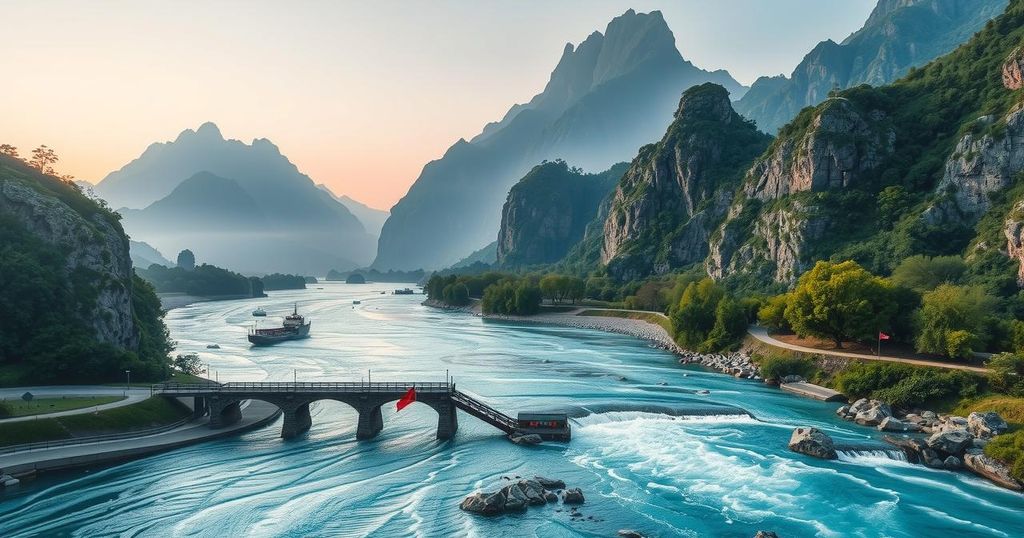The Rwanda-backed M23 rebels have intensified their control of Goma, causing widespread casualties and humanitarian concerns. Following heavy fighting, Goma residents observed a notable military presence, while humanitarian efforts face significant challenges. Calls for a ceasefire are mounting as the situation in the DRC worsens, with diplomatic negotiations urgently needed to prevent further violence.
The M23 rebels, supported by Rwanda, have significantly strengthened their control over Goma, the largest city in eastern Democratic Republic of the Congo (DRC). This development represents a severe setback for the Congolese army amid a prolonged conflict that has resulted in numerous fatalities and the displacement of millions. Following their entry into Goma on a Sunday, M23 fighters declared victory the very next day after three days of intense fighting, which claimed over 100 lives and injured nearly 1,000.
Currently, clashes have largely subsided in Goma, although sporadic gunfire continues in the northern neighborhoods. Local media report that the army of M23 is focused on eliminating the remaining areas of unrest. Bertrand Bisimwa, the political leader of M23, affirmed their commitment to establishing security and peace in Goma, asserting that their operations will secure tranquility for local residents.
Residents have observed that M23 militants, along with Rwandan troops, now control the airport and the city center. Reports indicate a marked reduction in the usual hustle and bustle, with streets empty, and communications remain strained. As military tensions persist, Rwanda’s regional ambassador confirmed that M23 does not intend to halt their military push beyond Goma without appropriate dialogues with the Congolese government, raising concerns over their potential advancement toward Bukavu.
Humanitarian organizations have raised alarms over the deteriorating situation, warning of impending mass displacements and food shortages. Medical facilities, such as Kyeshero Hospital, are inundated with casualties from the conflict, and logistical challenges have arisen due to looting. The International Committee of the Red Cross has called for the protection of civilians and the unhindered access of humanitarian workers to assist those in dire need.
M23, a group claiming to advocate for the rights of the Tutsi minority in DRC, has faced international scrutiny regarding its ties to Rwanda, which both denies and acknowledges military interactions. Predictions indicate that the ongoing conflict could spiral outward, with growing calls for a ceasefire accentuated by diplomatic efforts from various nations. Meanwhile, a virtual summit was scheduled, but Congolese President Felix Tshisekedi will abstain from participation, leaving the path toward resolution uncertain.
While Goma’s residents cope with power outages and limited access to communication, there have been movements of individuals seeking refuge in Rwanda. The International Crisis Group has urged immediate negotiations, warning that unchecked combat could rekindle the extensive violence experienced in the late 20th century, thereby complicating the geopolitical climate in the Great Lakes region further.
The ongoing conflict in the eastern DRC, particularly in Goma, involves various armed groups, with M23 being one of the most significant. M23 emerged in 2012 and has been accused of receiving support from the Rwandan government, which Rwanda denies. The DRC has faced a resurgence of M23’s military actions, which has increasingly destabilized the region and provoked international concern over human rights and humanitarian crises. Diplomatic efforts continue, but the situation remains precarious as violence escalates and impacts civilian populations severely.
The M23’s strengthened hold over Goma represents a critical escalation in the DRC’s ongoing conflict, posing serious humanitarian challenges for the population. As international calls for a ceasefire intensify, the need for a diplomatic resolution is urgent. Continued military aggression threatens to exacerbate the already dire conditions in eastern DRC, necessitating immediate and effective negotiations to restore peace and stability.
Original Source: www.aljazeera.com






